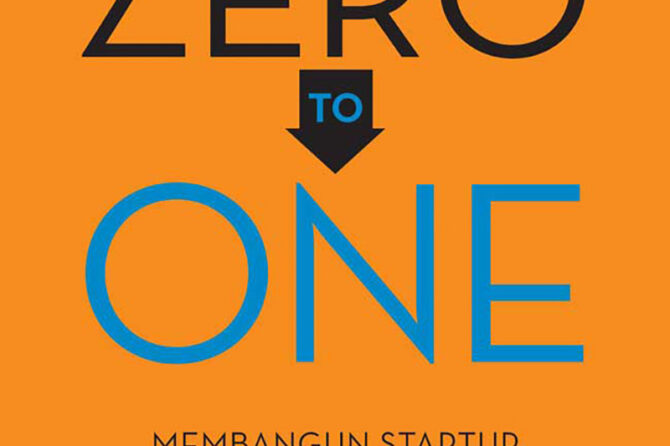
When we were working on establishing our startup during peak of Covid-19 pandemic, I was searching for motivation and a proper guide. Sometime back, I had read a great book “High-Hanging Fruit: Build Something Great by Going Where No One Else Will” by Mark Rampolla. I have already written a review about it earlier and you can read it at this link: Build something great by going where no one else will. This time, Google suggested “Zero to One” by Peter Thiel and Blake Masters, which was published in 2014 and is still an international best-seller. This also happened to be my second audiobook, which I listened to on Amazon’s Audible app during my morning walks and exercises. However, I find it difficult to concentrate on audiobooks, as my mind often drifts away, and I have to forcefully bring it back to what I’m listening to. I often have to rewind the audiobook to listen to the missed parts.
When I first cracked open “Zero to One: Notes on Start-ups, or How to Build the Future” by Peter Thiel and Blake Masters, I wasn’t entirely sure what to expect. After all, it’s not every day you delve into the mind of a tech billionaire known for his contrarian views on entrepreneurship, science, and technology. Little did I know that this book would take me on a mind-bending journey through the world of start-ups and innovation, challenging conventional wisdom at every turn.
Peter Thiel is a prominent figure in the world of technology, entrepreneurship, and venture capital. Born on October 11, 1967, in Frankfurt, Germany, Thiel later became a notable American entrepreneur, investor, and author. He is widely recognized for his co-founding role in PayPal, one of the earliest online payment systems, and for his early investments in companies like Facebook, LinkedIn, and SpaceX.

Thiel’s impact on the tech industry extends beyond his successful ventures. He is also known for his contrarian and thought-provoking perspectives on business, innovation, and education. Thiel’s ideas, often shared through his writings and lectures, challenge conventional thinking and have made him a prominent thought leader in Silicon Valley and beyond. Peter Thiel’s contributions to the world of technology and his unique viewpoints continue to influence and inspire entrepreneurs and innovators worldwide.
In this international best-seller, right from the outset, Thiel lays down a bold premise: “Every moment in business happens only once. The next Bill Gates will not build an operating system. The next Larry Page or Sergey Brin won’t make a search engine. And the next Mark Zuckerberg won’t create a social network. If you are copying these guys, you aren’t learning from them.” This declaration immediately sets the stage for a book that urges you to think beyond imitation and strive for true innovation, to go from “0 to 1.”
“Monopoly is the condition of every successful business.”
As I continued to read, Thiel’s emphasis on monopoly as the ultimate goal of a successful business intrigued me. He argues that a monopoly, in the sense of dominating a unique market, is the key to avoiding destructive competition. It’s a notion that challenges traditional thinking about business ethics, but it’s hard to dismiss when you consider the examples he presents.
“The most contrarian thing of all is not to oppose the crowd but to think for yourself.”
Contrarian thinking, another central theme, struck a chord with me. Thiel reminds us that real innovation comes from thinking differently, from breaking away from the herd and challenging the status quo. It’s a mindset that encourages you to question everything and seek out new opportunities, even in the face of scepticism.
“In a world of scarce resources, globalization without new technology is unsustainable.”
What surprised me most was that “Zero to One” isn’t solely about technology. Thiel makes a compelling case for innovation in various facets of business, from market strategies to company culture. He underscores that, in a world of scarce resources, globalization alone is unsustainable without new technology to support it.
“First, only invest in companies that have the potential to return the value of the entire fund.”
Scaling, as Thiel discusses, is critical for start-ups. The idea that a good start-up should have the potential for great scale built into its initial design resonated with me. It’s a reminder that success isn’t just about having a great idea; it’s about building a foundation that can support exponential growth.
“Customers won’t care about any particular technology unless it solves a particular problem in a superior way. And if you can’t monopolize a unique solution for a small market, you’ll be stuck with vicious competition.”
One of the most provocative ideas in the book is Thiel’s belief that successful companies are unique in their approach. He contends that they earn a monopoly by solving a problem in a distinctive way. This perspective challenges the notion that businesses should follow a universal formula, urging entrepreneurs to carve out their own niche and dominate it.
“Brilliant thinking is rare, but courage is in even shorter supply than genius.”
Throughout the book, Thiel’s thoughts on courage and brilliance stayed with me. He posits that brilliant thinking is rare but that courage is even rarer. It’s a reminder that many ground-breaking ideas are often dismissed due to a lack of courage in their pursuit. It prompted me to reflect on how often fear of failure or criticism holds us back from pursuing our most audacious ideas.
“If your product requires advertising or salespeople to sell it, it’s not good enough: technology is primarily about product development, not distribution.”
Thiel’s prioritization of product development over marketing also upended traditional business priorities. He argues that a superior product will naturally find its audience and succeed without excessive marketing efforts. It’s a perspective that challenges the pervasive belief that marketing can compensate for a mediocre product.
“Tolstoy opens Anna Karenina by observing: “All happy families are alike; each unhappy family is unhappy in its own way.” Business is the opposite. All happy companies are different: each one earns a monopoly by solving a unique problem. All failed companies are the same: they failed to escape competition.”
Overall, “Zero to One” is a book that will stretch your thinking and challenge your preconceptions about startups, innovation, and entrepreneurship. Whether you agree or disagree with Thiel’s views, it’s an intellectually stimulating read that invites you to question the status quo and consider what it truly means to create something new in a rapidly evolving technological landscape. This book isn’t just for aspiring entrepreneurs; it’s for anyone interested in understanding the dynamics of innovation and what it takes to build a transformative company. “Zero to One” will leave you with a fresh perspective and inspire you to think differently about the future of start-ups and innovation. It’s a book that lingers in your mind long after you’ve turned the final page.
Hereby I conclude by quoting Peter Thiel, “Today’s “best practices” lead to dead ends; the best paths are new and untried.”
Prahlada N. B
26 November 2023
Chitradurga

















Prahlada Sir,
Drawing inspiration from Mark Rampolla’s ‘High hanging fruit’ & Peter Thiel’s ‘From zero to one’, both great reads……
You have elaborately dwelt on startups & innovation.
Here is my take on startups in brief :
“ Any startup should have compelling vision , market research, an unwavering agile approach, strong team, efficient leadership, adaptability, embracing technology with ease & above all a customer centric focus “.
In today’s dynamic business landscape, all above attributes are essential for any startup to establish, succeed, excel & thrive 👍👌🏿🤩.
Reply